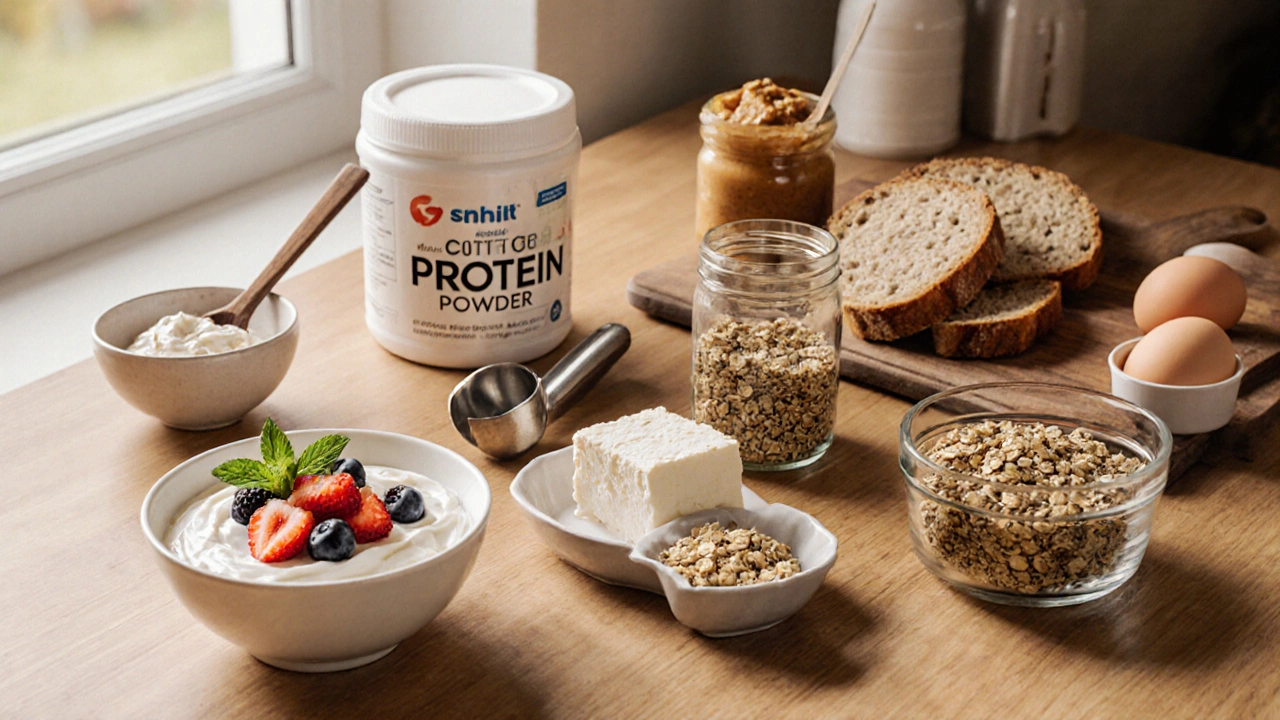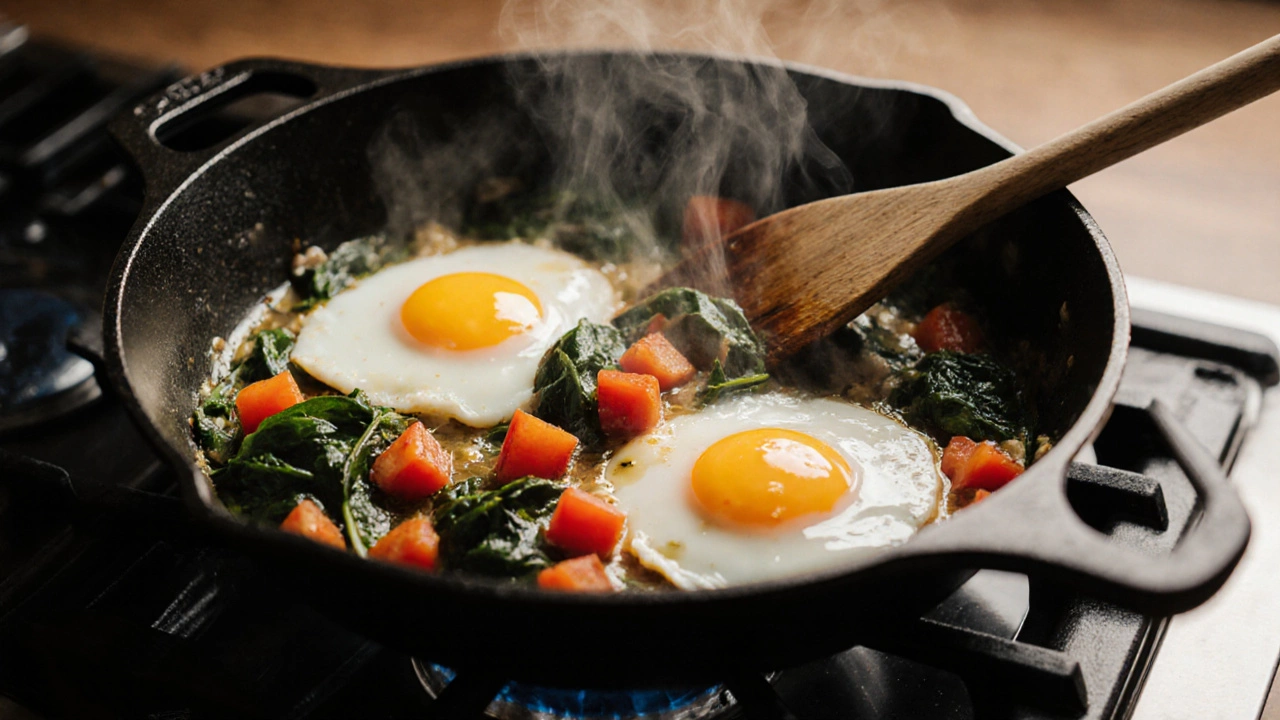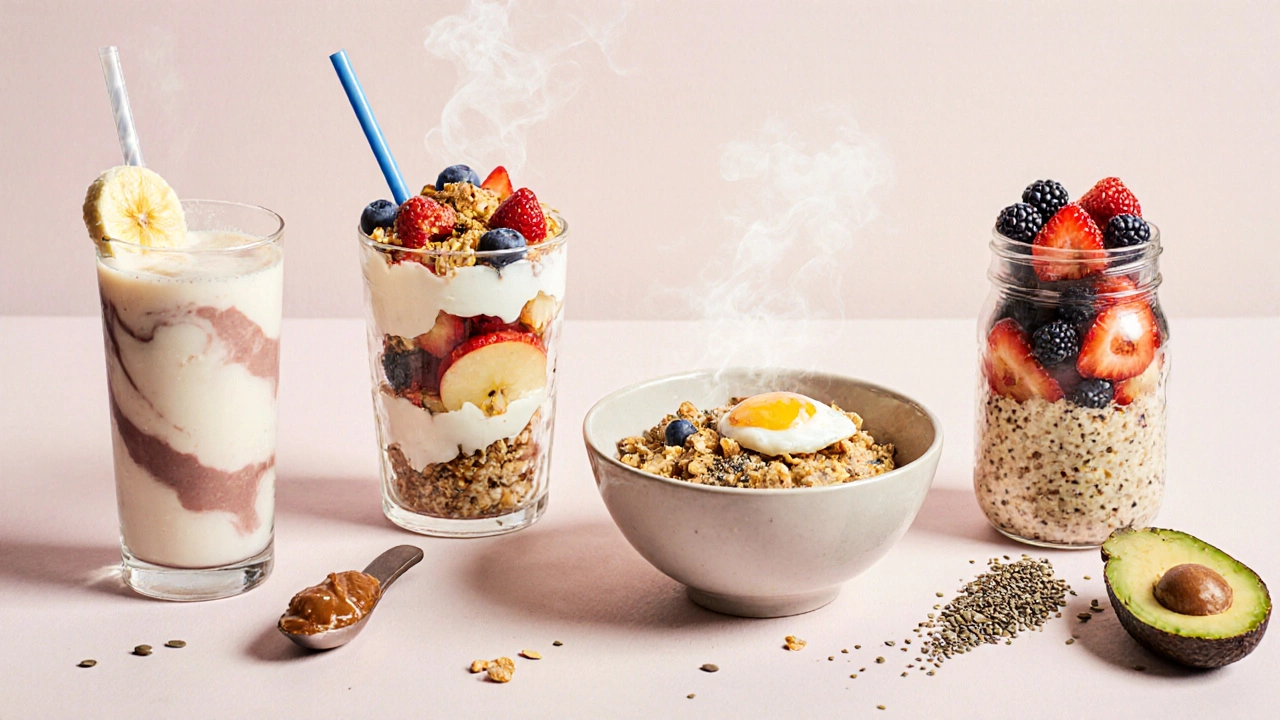Best Protein-Packed Breakfast Ideas for Energy & Muscle Growth

Protein Breakfast Calculator
Build Your Breakfast
Select your breakfast items and quantities to calculate total protein content
Protein Results
Choose ingredients to see your protein total
Recommended protein intake: 20-30g for optimal muscle growth and energy
Tips to Boost Protein
- Add 1 tbsp nut butter to oatmeal
- Swap regular milk for soy milk (7-8g protein per cup)
- Include 1 tbsp hemp seeds (3g protein)
- Use cottage cheese as a savory base
- Add a poached egg to avocado toast
When you think about protein breakfast, you probably picture eggs or a shake. Yet a well‑balanced, protein‑rich start can be both tasty and fast, giving you the fuel to power a workout, stay full till lunch, and support muscle repair.
Why a Protein‑Heavy Morning Matters
protein breakfast is a meal that delivers at least 20‑30 grams of high‑quality protein within the first two hours after waking. Research from the British Nutrition Foundation shows that consuming protein soon after sleep boosts muscle‑protein synthesis by up to 30% compared with delaying intake. It also helps stabilise blood sugar, curbing mid‑morning cravings.
For anyone training for strength or simply trying to keep the tummy satisfied, the morning is the perfect window to load up on amino acids. Think of it as a jump‑start for recovery, metabolism, and sustained energy.
Core Components of a High‑Protein Breakfast
To build a truly nutritious protein breakfast, aim for three pillars:
- Protein source - eggs, whey protein, Greek yogurt, cottage cheese, or plant‑based powders.
- Complex carbs - oats, quinoa, or whole‑grain bread to replenish glycogen.
- Healthy fats - nut butter, avocado, or seeds for satiety and hormone balance.
Below are the most versatile protein‑rich foods you can keep on hand.
Eggs are a complete protein containing all nine essential amino acids, with roughly 6g per large egg. They cook in minutes and pair well with veggies, cheese, or oats.
Greek yogurt offers around 10‑12g of protein per 100g, plus probiotics for gut health. Choose the plain, full‑fat version for the best nutrient profile.
Whey protein powder delivers 20‑25g of quickly absorbed protein per scoop, making it ideal for shakes. It mixes well with milk, water, or plant‑based milks.
Cottage cheese is a low‑fat, high‑casein dairy delivering about 14g of protein per half‑cup. Its thick texture works great in bowls or savory dishes.
Quinoa provides 8g of complete protein per cup, plus fiber and minerals like magnesium. It cooks like a grain but behaves like a seed.
Oats contain about 5‑6g of protein per ½‑cup dry serving and are rich in beta‑glucan for heart health. Blend them into a smooth base for overnight jars or warm porridge.
Don’t forget nut butter - whether peanut, almond, or cashew - adds 4‑8g of protein per tablespoon plus healthy monounsaturated fats.

Five Quick Protein‑Packed Breakfast Recipes
All the meals below hit the 20‑gram protein mark and can be prepped in under 10minutes.
1. Classic Protein Shake
Ingredients:
- 1 scoop whey protein
- 250ml unsweetened almond milk
- ½ frozen banana
- 1 tbsp nut butter
- A handful of spinach (optional)
Blend until smooth. You get about 28g of protein, plus potassium from the banana and antioxidants from the greens.
2. Veggie‑Egg Scramble
Ingredients:
- 3 large eggs
- ¼ cup diced bell peppers
- ¼ cup chopped spinach
- 1 tbsp olive oil
- Salt, pepper, and a pinch of smoked paprika
Heat oil, toss veggies for 2minutes, then pour in beaten eggs. Stir until set. This dish provides roughly 21g of protein and a dose of leafy greens.
3. Greek Yogurt Parfait
Ingredients:
- 200g plain Greek yogurt
- ¼ cup mixed berries
- 2 tbsp granola (low‑sugar)
- 1 tsp honey (optional)
Layer yogurt, berries, and granola in a jar. You’ll get about 22g of protein plus antioxidants from the fruit.
4. Quinoa Breakfast Porridge
Ingredients:
- ¾ cup cooked quinoa
- 200ml unsweetened soy milk
- 1 tsp cinnamon
- 1 tbsp chia seeds
- ½ sliced apple
Warm quinoa and soy milk together, stir in cinnamon and chia, then top with apple. Protein content lands around 19g - close enough when paired with a side of nut butter for an extra boost.
5. Overnight Oats with Protein Powder
Ingredients:
- ½ cup rolled oats
- 1 scoop whey protein (vanilla works well)
- 200ml skim milk or plant‑based milk
- 1 tbsp flaxseed meal
- ½ cup mixed berries
Combine everything in a jar, shake, and refrigerate overnight. In the morning you have a ready‑to‑eat bowl with roughly 27g of protein.
Recipe Comparison Table
| Recipe | Protein (g) | Prep Time | Cost per Serving (GBP) |
|---|---|---|---|
| Classic Protein Shake | 28 | 2min | £1.20 |
| Veggie‑Egg Scramble | 21 | 5min | £1.50 |
| Greek Yogurt Parfait | 22 | 3min | £1.80 |
| Quinoa Breakfast Porridge | 19 | 7min | £1.70 |
| Overnight Oats w/ Protein Powder | 27 | 5min + 8h chill | £1.40 |

Tips to Boost Protein in Any Breakfast
- Add a spoonful of nut butter to oatmeal or smoothies.
- Swap regular milk for fortified soy or pea milk, which typically contains 7‑8g of protein per cup.
- Stir in a handful of hemp seeds - they give about 3g of protein plus omega‑3s.
- Use cottage cheese as a base for savory breakfast bowls; it blends nicely with herbs and diced veggies.
- Top avocado toast with a poached egg or sliced smoked salmon to hit the protein target.
Common Pitfalls & How to Avoid Them
Even with good intentions, breakfast can slip into a low‑protein trap.
- Relying on sugary cereals. They spike blood sugar, then crash, leaving you hungry again. Replace them with high‑fiber oats or quinoa.
- Skipping the protein source. A fruit‑only morning rarely reaches 20g. Pair fruit with Greek yogurt, a scoop of protein powder, or a hard‑boiled egg.
- Overloading on fats but not protein. While nut butter is great, two tablespoons alone give only ~8g protein. Combine with dairy or egg‑based foods.
- Ignoring portion size. A single egg provides 6g; three eggs are needed for a solid protein hit, but watch calories if you’re cutting.
Address these issues by planning ahead: prep overnight oats, keep a bag of protein powder at work, or boil a batch of eggs on the weekend.
Frequently Asked Questions
How much protein should a breakfast contain?
Aim for 20‑30grams of high‑quality protein. This range supports muscle protein synthesis after an overnight fast and helps you stay satisfied until the next meal.
Can a plant‑based breakfast meet the protein goal?
Absolutely. Combine foods like tofu scramble, soy‑based yogurt, quinoa, hemp seeds, and a scoop of plant‑based protein powder. A typical tofu‑and‑veggie scramble can deliver 22g of protein.
Is a protein shake a good daily habit?
If you struggle to hit protein targets with whole foods, a shake is a convenient supplement. Keep it under 300kcal and pair it with a small whole‑food snack for balanced nutrition.
What’s the quickest high‑protein breakfast for busy mornings?
A ready‑to‑drink protein shake mixed with milk and a handful of nuts takes less than two minutes. You can also grab a pre‑made Greek yogurt cup and sprinkle some granola on top.
Should I count protein from dairy the same as meat?
Both provide essential amino acids, but dairy (especially whey and casein) is digested quickly or slowly, respectively, giving you flexibility. Combine them with other sources for a complete profile.